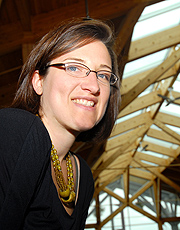Researcher Investigating the Way Educators Evaluate Medical Student Performance
October 21, 2011
|
Next month, the largest medical education conference in North America will take place in Denver, Colorado, and the University of Northern British Columbia (UNBC) will be there. In fact, researcher Andrea Gingerich will give the only review paper presentation of the conference. Gingerich, a researcher in the Northern Medical Program (NMP) at UNBC, is presenting her work, which suggests ways to explain differences in medical educators’ judgments of student performance. The work was also published in the most recent edition of the journal Academic Medicine. The journal and conference are organized by the American Association of Medical Colleges, an influential body in the way medical programs are taught. |
Media Download Click on a thumbnail to access a high resolution image. Andrea Gingerich |
